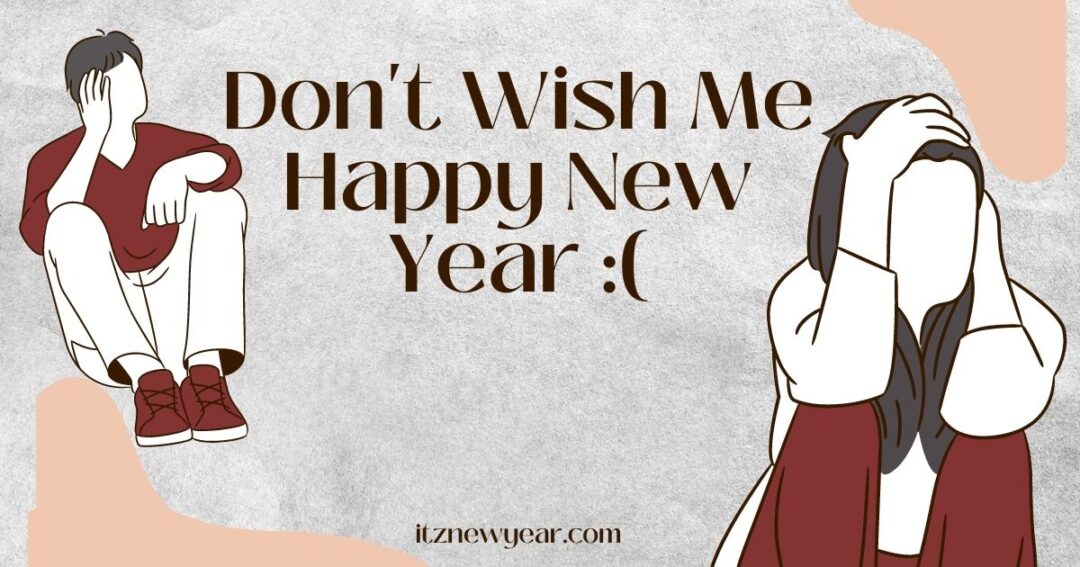Welcome to our discussion on responding when someone says, “Don’t wish me happy new year,” and how to avoid offending others with your greetings. The new year is a time of high levels of celebration, reflection, and new beginnings, but not everyone wants to be wished a happy new year.
There are many great reasons why someone may choose not to participate in new year’s celebrations, including cultural differences, personal preferences, and difficult experiences associated with the holiday.
It’s important to respect these choices and to be mindful of other people’s feelings during this time of year.
This article will explain why respecting other people’s preferences is important and offer tips on responding when someone tells you, “Don’t wish me happy new year.”
Reasons Why People May not Want to be Wished a Happy New Year
The most prevalent reasons why someone might not want to be wished a happy new year are cultural and religious differences. It’s vital to be aware of and respectful of the varying customs and beliefs that various cultures and religions observe during the turn of the calendar.
For instance, some cultures celebrate the new year on a different day or with different rituals than in the West. It’s also possible that some people’s spiritual or religious convictions are at odds with New Year’s celebrations.
Personal preferences are another valid reason why someone may not want to be wished a happy new year. Some people don’t enjoy the holiday and prefer to treat it like any other day.
Others may have had negative experiences associated with the new year, such as losing a loved one or a traumatic event, and may find the holiday triggering or uncomfortable.
Difficult experiences associated with the new year can also be why someone may choose not to participate in the new year’s celebrations.
For example, someone who has struggled with addiction may find the holiday difficult because it’s often associated with excessive drinking and partying.
It’s important to be sensitive to these experiences and to respect people’s wishes to opt out of new year’s celebrations.
Also Read: How to celebrate new years eve alone at home
Why it’s Important to Respect People’s Wishes
Respecting other people’s preferences is important to building empathy and understanding in our communities. When we respect someone’s wishes, we value their feelings and beliefs.
This is especially important during times of celebration, when people may feel pressure to conform to certain norms or traditions.
Respecting someones wish not to be wished a happy new year also avoids potentially triggering or uncomfortable situations.
For example, someone who has lost his loved one would definitely find it difficult to hear “happy new year” because it reminds them of their loss.
By respecting their wishes, we can avoid causing unnecessary pain or discomfort.
Respecting people’s wishes demonstrates respect for different beliefs and traditions.
We live in a completely diverse world, and it’s important to celebrate and appreciate these differences.
By respecting someone’s choice not to participate in new year’s celebrations, we demonstrate our commitment to inclusivity and diversity.
How to Respond when Someone Tells you, “Don’t wish me happy New Year.”
If someone tells you, “Don’t wish me happy new year,” it’s important to respect their wishes and answer them in a respectable way that shows you understand and value their feelings. Here are a few great yet practical tips on how to respond in a respectful and understanding way:
Acknowledge their feelings:
The very first step is acknowledging their feelings. I understand that the new year isn’t everyone’s favorite holiday, and I respect your decision not to celebrate.
Offer an alternative greeting:
If you still want to acknowledge the new year without saying “happy new year,” you could use plenty of alternative greetings. For example, you could say, “wishing you a great start to the new year,” or “May this year bring you happiness and success.”
Don’t take it personally:
It’s important to remember that someone’s decision not to participate in new year’s celebrations does not reflect how they feel about you. It’s simply a personal choice, and it’s important to respect it.
How to Avoid Offending Others with Your Greetings On New Year
It’s also important to remember how others may receive your new year’s greetings. Here are a few usable tips on how to avoid offending others with your greetings:
Consider cultural and religious differences:
As discussed earlier, different cultures and religions have traditions and beliefs surrounding the new year. Be aware of these differences and consider how people may receive your greetings from different backgrounds.
Be sensitive to difficult experiences:
If you know someone who has had a difficult experience associated with the new year, be mindful of how your greetings may be received. It’s better to err on caution and offer a more neutral greeting.
Be inclusive:
Not everyone celebrates the new year similarly, so your greetings must be inclusive. Use more general greetings, such as “wishing you all the best in the new year” or “hope this year brings you joy and success.”
Alternative Ways to Celebrate the New Year
Parties, fireworks displays, and the countdown to midnight are typical New Year’s Eve activities. Some people, however, might not consider this to be a good moment. That’s why it’s useful to be aware that New Year’s Eve isn’t the only method to ring in the new year.
Staying at home and relaxing is another option. Those who enjoy a low-key party could find this option very intriguing.
As an alternative to going out, you and your loved ones could stay in and enjoy a home-cooked supper, a movie, or a game of board games. Without the distractions of a large gathering, this can be a wonderful way to spend time with loved ones.
There’s also the option of thinking back over the past 12 months. Consider your successes, failures, and opportunities for development as the new year begins.
Make a plan for the New Year by writing it down or drawing it on a board. Clarifying your hopes and dreams for the upcoming year can provide you focus and motivation.
In the end, helping others is yet another way to welcome the New Year. It is traditional to lend a hand those in need when the new year begins.
Think about helping out at a homeless shelter, food bank, or other charitable organization in your area.
As the new year begins, this might be a fantastic opportunity to make a good difference in your neighborhood.
FAQ
Q: Why would someone say, “Don’t wish me a happy new year”?
A: Many reasons someone may not want to be wished a happy new year. It could be due to personal or cultural reasons, such as not celebrating the holiday, feeling sad or stressed about the past year, or having a negative association with the holiday. It’s important to respect their wishes and find alternative ways to express your good wishes.
Q: How can I respond when someone says, “Don’t wish me a happy new year”?
A: You can respond by acknowledging their feelings and expressing your understanding. You can say, “I understand this holiday may not be significant for you, but I still want to wish you a happy and healthy year ahead.” It’s important to be respectful and avoid assumptions about their beliefs and feelings.
Q: Can I still celebrate the new year if someone tells me not to wish them a happy new year?
A: Yes, you can still appropriately celebrate the new year. It’s important to be mindful of others’ preferences and find alternative ways to express your good wishes. You can also take the opportunity to reflect on the past year and set goals for the new year.
Q: How can I avoid offending others with my greetings?
A: One way to avoid offending others is to be mindful of their beliefs and traditions. You can ask if they celebrate the holiday and how they prefer to be greeted. You can also avoid assuming everyone celebrates the holiday and respects those who do not. Additionally, using inclusive language such as “Happy holidays” or “Season’s greetings” can be a way to show respect for different beliefs and traditions.
Q: What are some alternative ways to celebrate the new year?
A: Some alternative ways to celebrate the new year include having a quiet night, reflecting on the past year, and volunteering in your community. You can also set goals for the new year, spend time with loved ones, or take a moment to practice self-care.
Q: Why is it important to respect others’ preferences?
A: Respecting others’ preferences is important for building strong and healthy relationships. It shows that we value others’ opinions and feelings, promotes empathy, and helps to avoid misunderstandings and conflicts. It’s important to be mindful of others’ preferences and find ways to create an inclusive and respectful environment.
Q: What are some cultural differences around celebrating the new year?
A: Different cultures have different ways of celebrating the new year. For example, the new year is celebrated in China with a week-long Spring Festival holiday. In many Latin American countries, people celebrate the new year by eating twelve grapes at midnight, each representing a wish for the upcoming year. It’s important to be aware of and respectful of these cultural differences.
Q: Is it appropriate to wish someone a happy new year if they have experienced a difficult year?
A: It’s important to be sensitive to not everyone may have had a good year. If you’re unsure whether it’s appropriate to wish someone a happy new year, you can ask how their year has been and offer support or a listening ear. If they express that they would prefer not to be wished a happy new year, it’s important to respect their wishes.
Q: What should I do if someone wishes me a happy new year and I don’t celebrate the holiday?
A: You can respond by thanking them for their good wishes and politely informing them that you don’t celebrate the holiday. You can also take the opportunity to educate them about your beliefs or traditions or suggest an alternative way to express their good wishes.
Q: Can I still send new year’s greetings even if I’m unsure if the person celebrates the holiday?
A: It’s always better to err on caution and respect others’ beliefs and preferences. If you’re unsure whether someone celebrates the holiday, you can ask if they do and how they prefer to be greeted. Alternatively, you can use more inclusive language such as “Have a great start to the year” or “Wishing you all the best in the upcoming months.”
Q: How do you show appreciation and gratitude for the past year?
A: Some ways to show appreciation and gratitude for the past year include reflecting on positive experiences, expressing gratitude to loved ones, practicing mindfulness and self-care, and setting intentions and goals for the new year. It’s important to take time to appreciate the good things that have happened and to acknowledge any challenges that were overcome.





